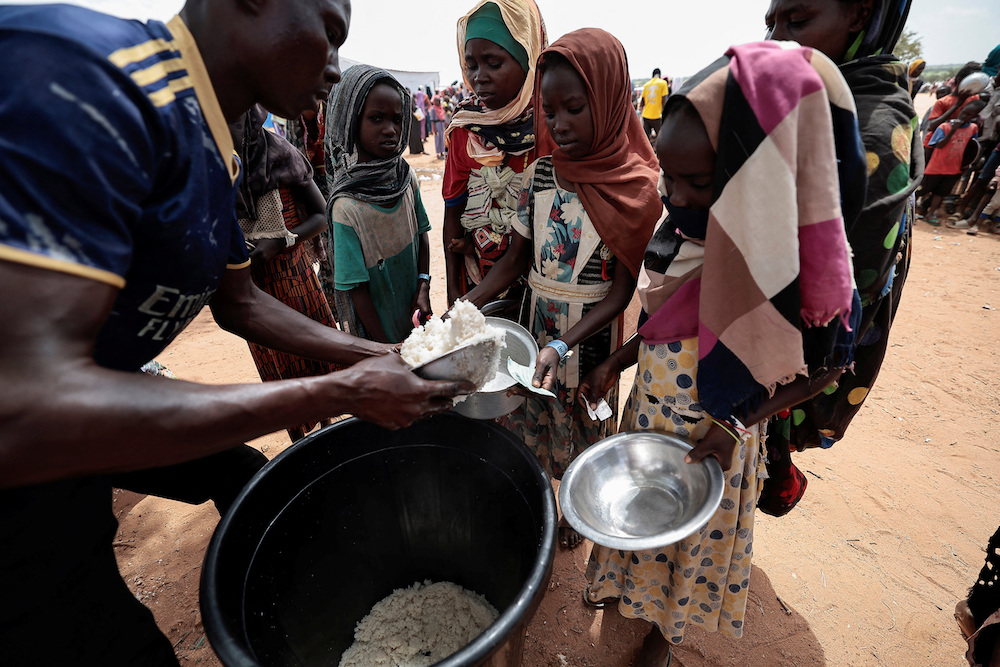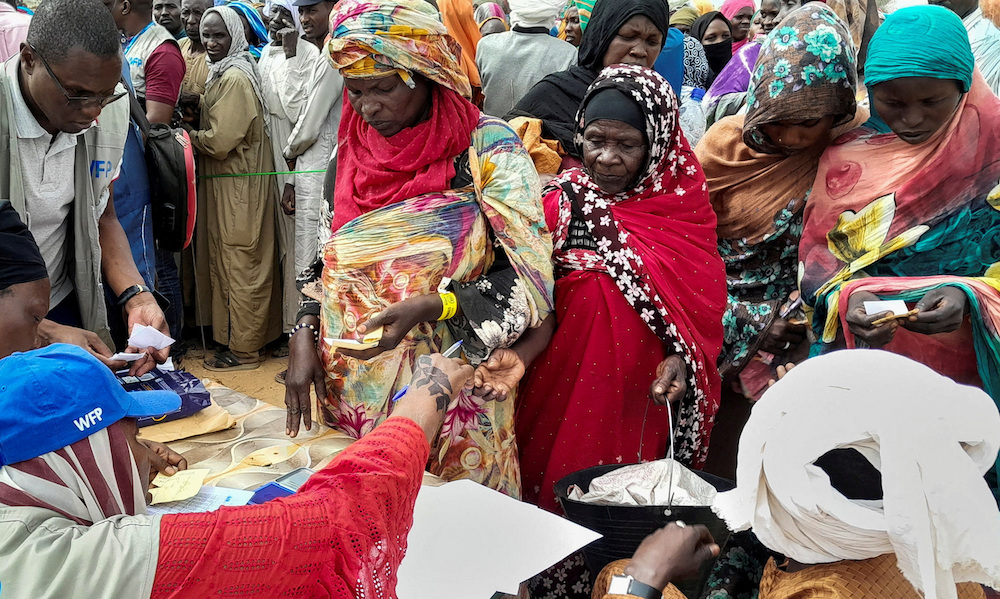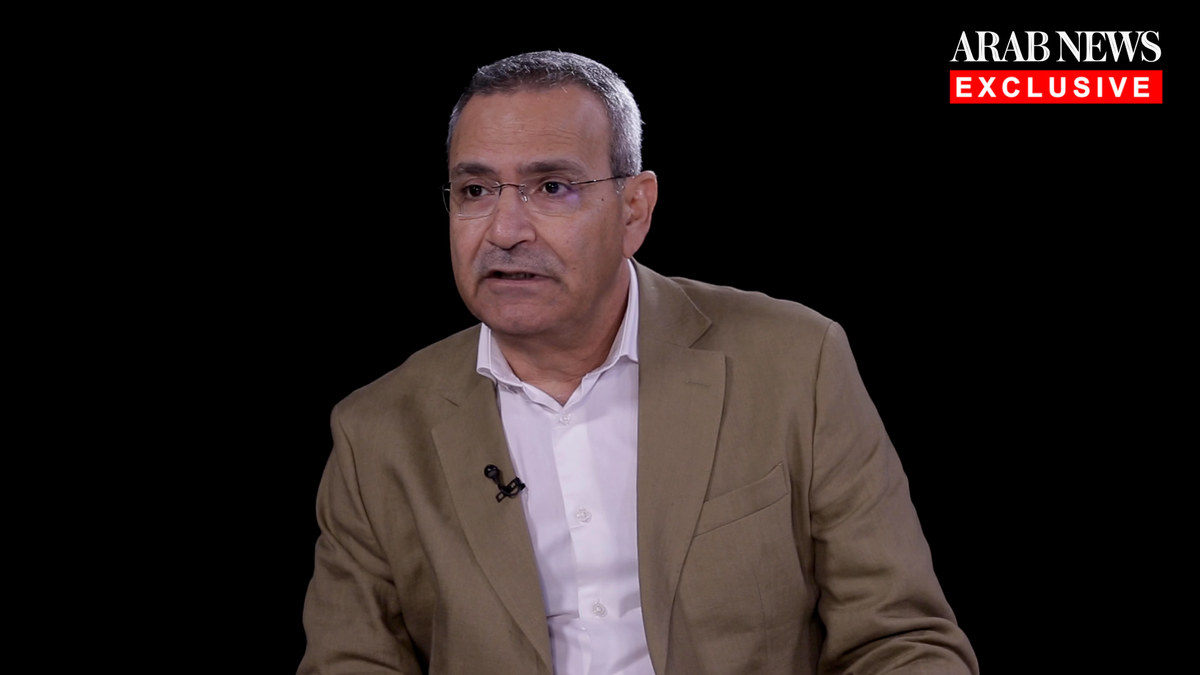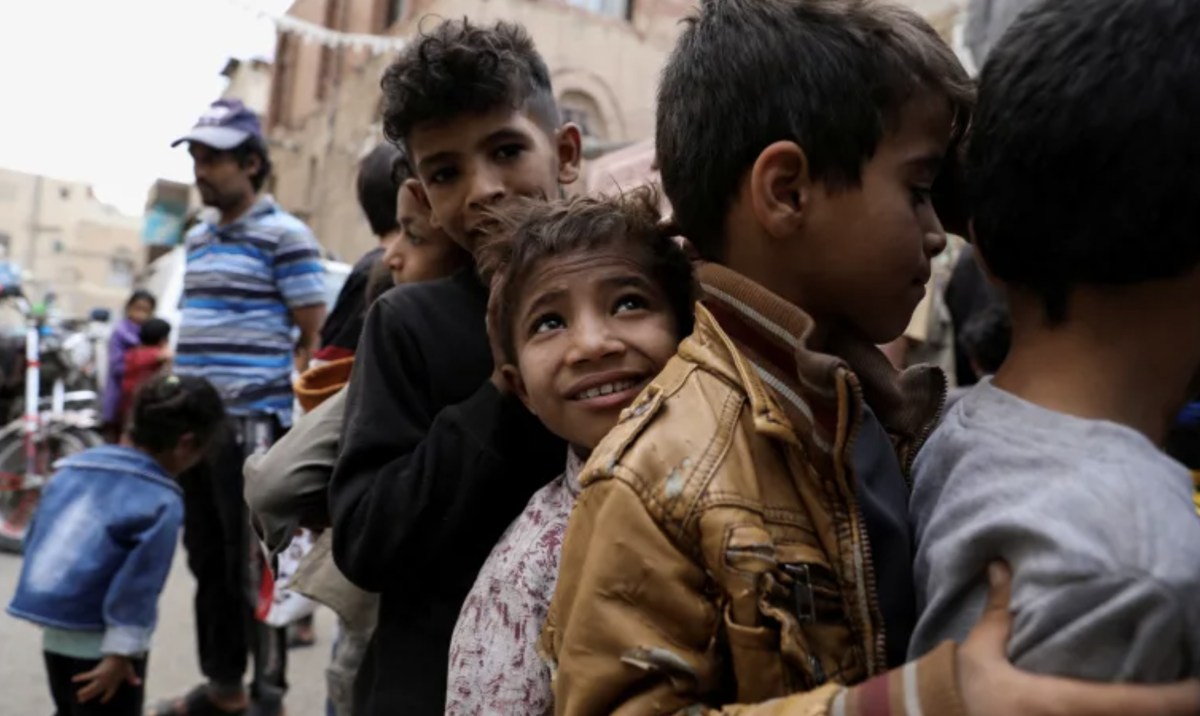DUBAI: As conflict, natural disasters and climate change stalk swathes of the world, a simultaneous epidemic is spreading: an estimated 345 million people in 79 countries are facing acute hunger.
Abdel-Mageed Yahia, director of World Food Programme’s UAE office and representative for the Gulf Cooperation Council region, says that unless food needs are met, the hunger epidemic may become catastrophic.
“It’s true that this year, we are facing an unprecedented hunger level,” he said during a special interview with Arab News Japan recorded in Dubai.
“We said 2023 is going to be a difficult year, although we had a lot of success in 2022 when we were able to reach around 140 million people.”
Of the more than 340 million facing hunger in the world, he added, 40 million are “in the extreme level of hunger, which is one step away from famine.”

Sudanese girls who fled the conflict in Geneina in Sudan's Darfur region, receive rice portions from Red Cross volunteers in Ourang on the outskirts of Adre, Chad July 25, 2023. (Reuters)
According to Yahia, “all of it starts with the conflicts which we are seeing in different parts of the world, from the Middle East to Africa, from the Horn of Africa and the Sahel to Afghanistan.”
Climate change is also playing a major role, he said, adding: “Economic downturn is another cause, which is the impact of COVID-19.”
Long-term shifts in temperatures and weather patterns, better known as climate change, can be natural, but almost all research suggests humans are overwhelmingly responsible for global warming in the last 200 years.
Conflict, however, is the “number one” driver of food insecurity, Yahia said.
“If I can give you the example of Sudan, in a matter of just four months since the start of the conflict, you have around four million people who are displaced, who have either moved to another location inside Sudan or fled the country to neighboring countries.
“This has created a burden for the countries of destination, such as South Sudan, that were already struggling to offer assistance (to existing displaced populations).”
Such a situation is not unique to Sudan and its neighbors. Yahia, who was WFP representative, country director and emergency coordinator in Jordan, responsible for one of the largest WFP emergency operations in the Middle East region, has first-hand experience dealing with food crises.
He pointed out that hosting approximately half a million Syrian refugees whom the WFP supports in Jordan, plus a million more in Lebanon, similarly adds to the challenges already being faced by recipient countries.
While shifts in weather patterns, wars and pandemics are nothing new, the occurrence of all these events at once has forced the WFP to “prioritize,” Yahia said.

“In other words, take from the hungry to give to the starving. That is the situation we are exactly in. When you are faced with an increasing number of populations in need of humanitarian assistance on the one hand and decreasing funds on the other hand, that’s exactly what you do,” he said.
“We are struggling also with funding, because there are now, call it competing priorities, from Afghanistan to Yemen, to Syria, to the Horn of Africa, to the Sahel, to Sudan.”
He said the WFP will most likely be unable to raise the $24 billion it needs to reach 170 million of the world’s most vulnerable.
“I remember, about 15 years ago, we were talking in the WFP if we will be able to manage two crises at a time. But now, we are talking about more than 10 crises that are going on at the current time. And you see the effect of all this,” Yahia said.
“Last year was a success because we were able to raise $14 billion and reach 140 million people. But this year, our estimate is that we may be able to reach or raise even $10 billion. So, the situation is that hunger is increasing on one side and funding is declining on the other side, which put us in a really difficult situation.”
Against this backdrop, Saudi Arabia has stepped in to save a critically important food aid program in Jordan. In August, the WFP welcomed a donation of $6.8 million from KSrelief, which made possible the continuation of its food assistance programs for Syrian refugees living in camps in Jordan.
The latest contribution is far from the Kingdom’s first: since its inception in 2015, KSrelief has contributed more than $1.25 billion to the WFP for schemes in 26 countries.

With the influx of displaced people increasing demand for food in already war-ravaged countries, the conflict in Sudan has disrupted essential supply chains and trade routes. (Reuters)
“This donation helped to rescue the operations in Jordan, rescue … the food pipeline that we have maintained to the refugees inside the camps. On Sept. 1, we were supposed to announce that we are cutting or reducing the assistance to the population in the camps. The (donation) came as a (timely) rescue of our operation in Jordan and we will see immediate effects,” Yahia said.
“The refugees in camps will continue to receive their vouchers or food rations continuously. However, there are also other refugees still, because this contribution is directed toward the refugees in the camps.
“There are refugees outside the camps. Should we not receive contributions from other donors, we will still face the situation of opting for that solution, which is a very hard decision to make. But the Saudi contribution was a real rescue of our operation in Jordan and well timed, too.”
With the influx of displaced people increasing demand for food in already war-ravaged countries, the conflict in Sudan has disrupted essential supply chains and trade routes.
“When you have a country in this crisis, import of food is disrupted, trade routes are disrupted, and so on and so forth. So, it does not look good. It was not looking good even before the crisis, and now it is going in absolutely the wrong direction,” Yahia said.
“But we are there on the ground. We started a cross-border operation from Chad into West Darfur, and then reached other areas in Sudan. With difficulty, we have been able to reach Khartoum, but (as I said) with difficulty. Access remains an issue for us.”
HUNGERFACTS
* 783m People worldwide unsure of where their next meal will come from.
* 345m People facing high levels of food insecurity globally in 2023.
* 129,000 People in Burkina Faso, Mali, Somalia, South Sudan set to experience famine.
* $25.6m Saudi donation to the WFP for Syrian refugees in Jordanian camps since 2021.
Yahia reiterated that nearly half of the Sudanese population is experiencing food insecurity. The situation was dire even before violence erupted between the Sudanese Armed Forces and paramilitary Rapid Support Forces group on April 15.
“The conflict came and added more oil to the fires that were already burning,” he said. “Sudan was a host to refugees from other countries as well, despite the (precarious) economic situation. So, 19 million people are projected to need humanitarian assistance. Now we are facing issues like access because of the security situation.”
While the Sudan crisis and climate change wreak havoc on famished populations in the Sahel and the Horn of Africa, one conflict threatens the food security of the entire world: Russia’s invasion of Ukraine.
Given that the two supplied more than a quarter of the world’s wheat — 40 percent of WFP’s supplies of the cereal — the 2022 invasion threatened to cause a massive food shortage and spike in food prices worldwide, particularly for countries relying on food aid.
“We have seen, of course, sharp increases in April 2022 following the eruption of the war there, which at that time (compounded the rise) in shipping costs because you had the effect of the COVID, of the supply chain disruption at that time,” Yahia said.

Abdel-Mageed Yahia, director of the UAE Office & Representative to the GCC, UN World Food Programme, speaking during an interview with Arab News en Francais Regional Manager Ali Itani. (AN Photo)
Global food prices have returned to pre-invasion levels, he said, but warned that the ongoing conflicts may cause the supply situation to deteriorate once again.
“We will continue to see a reduction in the production of food in Ukraine because farmers cannot access their farms because of landmines, because of (problems in getting) access to ports, and so on,” he said.
According to Yahia, the WFP was able to provide approximately two billion meals to Ukrainians affected by war, and has maintained its presence on the ground as a third of Ukrainians still face food insecurity.
In July Russia withdrew from a year-old UN and Turkiye-brokered agreement that had allowed grain, foodstuffs, fertilizers and other commodities to be shipped from Ukraine’s blockaded Black Sea ports to some of the world’s most food-insecure countries.
Yahia says the collapse of the grain deal and closure of the critical Black Sea corridor could have effects far beyond the borders of Ukraine. “This might see an increase, of course, of the shipping costs to source these commodities from elsewhere in the world,” he said.

Boys stand in line as they wait to receive meals from a charity kitchen in Sanaa, Yemen. (Reuters/File Photo)
Though conflict is the main reason for the spread of hunger worldwide, climate change is also playing a major role in causing food insecurity, according to Yahia, who has more than 30 years’ experience working in the humanitarian field and has served in areas devasted by wars, genocide, famine as well as natural disasters.
The Intergovernmental Panel on Climate Change’s 2019 report Climate Change and Land stated that climate change has already begun to affect food security, particularly in low-latitude regions and arid climates of Africa.
Pastoral societies, the report added, are particularly vulnerable to the effects of changing climate.
“Climate is playing a role similar to conflict when it comes to reduction in the production of food, in terms of displacement of population, as we saw last year in the Horn of Africa, Somalia and Ethiopia among other places,” Yahia said.
“I think climate is really playing a big role here. It can no longer be talked about inside just closed rooms. Climate is a real thing affecting global food security.”














